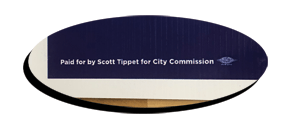A lawyer friend who does a lot of campaign-related work emailed me this week with a list of her concerns about some candidates not understanding campaign laws/regulations.
For experienced campaign workers, it was nothing complex or arcane, just things we go over with clients and their teams early on. But for first-timers, she brought up some really good issues. One thing that struck me as funny: “SIGNAGE, WEBSITE, ADVERTISING. These must include a ‘paid for by’ notification.” It’s funny because most disclosures I see have more information than needed.
Then I stopped by a party headquarters and started looking at signs and other literature and realized there were no disclosures AT ALL on about half the materials. Most of the candidates were incumbents, too.
So, here’s a short breakdown of what needs a “paid for by …” disclosure and what it needs to say.
In Kentucky, the Registry of Election Finance (KREF) regulates campaign contributions, expenditures and related things. If you are not running in Kentucky, check with your secretary of state, county or state Board of Elections, or county clerk to find out who regulates the race you are interested in, and get a copy of the rules and regulations before you get into the race! For federal races (U.S. representatives, senators or president) it’s the Federal Elections Commission (FEC).
What needs a “paid for by” in Kentucky?
There is a lengthy, detailed explanation at KRS (121.190(1)) and KAR (2:110), but the long and the short of it is … If it is advertising, it needs to say “paid for by.”
There are exceptions, but as a rule, we put “paid for by” on virtually everything we design for our clients.
In general, small items (NOTE KREF’s definition of small has changed — now it’s 3.5” x 5” or smaller) do not need the disclosure. As possible exceptions, KREF lists balloons, calling cards, emery boards, bumper stickers, matchbook covers, pencils, shirts, and caps.
What does it need to say?
 For candidates and their election committees (the rules for donor groups/individuals are different):
For candidates and their election committees (the rules for donor groups/individuals are different):
GOOD DISCLOSURES (Assuming the candidate’s name is John Smith):
Paid for by John Smith
Paid for by Committee to Elect John Smith. (If you filed a committee name when you filed your KREF papers.)
BAD DISCLOSURES:
Paid for by the candidate.
Paid for by John.
NOTE: You do not have to include the treasurer’s name or address! It’s not wrong to include it, but it’s unnecessary and has been for over 20 years.
Paid for by other
Now, if another person or organization pays for an ad on behalf of a candidate, they must follow applicable limits and reporting requirements, AND they must include their address as part of the disclosure.
GOOD DISCLOSURES for non-candidate/group
Paid for by Mary Jones 100 Main Street, Yourtown, KY 40000
Paid for by Your County Democratic Executive Committee 600 Main Street, Yourtown, KY 40000
Note: Committees do not have to include an address if they are promoting the party in general and not specific candidates.
In our years working races in Kentucky, we have always found the people at KREF to be efficient and helpful. If you have a question on this or ANYTHING, call them and ask it; they want to help!